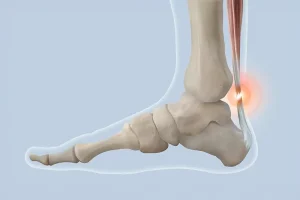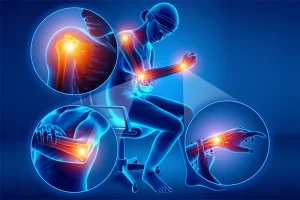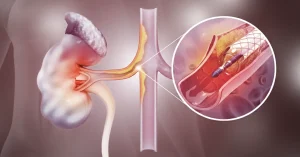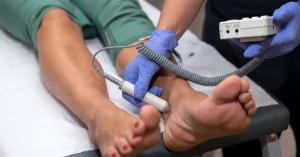Rheumatoid arthritis is a chronic autoimmune inflammatory disease that mainly affects the joints. It can lead to pain, stiffness, and, in advanced stages, joint deformities and loss of function. Early diagnosis and proper treatment are crucial to prevent complications and maintain quality of life.
What Is Rheumatoid Arthritis?
Rheumatoid arthritis (RA) is an autoimmune disorder in which the immune system mistakenly attacks the body’s own tissues — primarily the synovial membrane lining the joints. This causes chronic inflammation that can damage not only the joints but also organs such as the lungs, skin, or heart.
Causes of Rheumatoid Arthritis
The exact cause is still unknown, but certain risk factors contribute to its development:
- Genetics: Family history increases risk;
- Environmental Factors: Exposure to cigarette smoke, infections, or harmful substances;
- Hormonal Imbalances: RA is more common in women, suggesting hormones play a role;
- Immune System Dysfunction: An abnormal immune response triggers joint inflammation.
Symptoms of Rheumatoid Arthritis
Symptoms vary but often include:
- Joint pain and swelling, usually symmetrical (both hands, knees, or wrists);
- Stiffness, especially in the morning or after inactivity;
- Chronic fatigue;
- Low-grade fever;
- Unintentional weight loss;
- Rheumatoid nodules — small lumps under the skin, often on the elbows.
How Is It Diagnosed?
Diagnosis involves:
- A detailed clinical exam;
- Blood tests: ESR, CRP, rheumatoid factor (RF), and anti-CCP antibodies;
- Imaging: X-rays, ultrasound, or MRI to check for joint damage.
Treatment of Rheumatoid Arthritis
Treatment aims to control inflammation, slow disease progression, and maintain a good quality of life. Options include:
1. Medications
- NSAIDs: Reduce pain and inflammation
- Corticosteroids: Used for severe or acute flare-ups
- DMARDs (Disease-Modifying Anti-Rheumatic Drugs): Such as methotrexate, to slow progression
- Biologics: Advanced treatments that target specific immune pathways (e.g., adalimumab, etanercept)
2. Physiotherapy
Regular exercises help maintain mobility and muscle strength, preventing deformities.
3. Surgery
In advanced cases, joint replacement or other orthopedic procedures may be required.
Lifestyle and Recommendations
- Follow an anti-inflammatory diet rich in omega-3s, vegetables, and fruits; avoid processed foods;
- Engage in regular, gentle physical activity suitable for your condition;
- Avoid smoking and manage stress levels;
- Attend regular check-ups to adjust treatment as needed.
Rheumatoid Arthritis in Children — Juvenile Idiopathic Arthritis
When RA occurs in children under 16, it is called juvenile idiopathic arthritis. Pediatric care is essential, as the disease may present differently and requires tailored treatment.
Prognosis
Rheumatoid arthritis is chronic, but with modern treatments and lifestyle adjustments, many patients maintain an active, independent life. Early diagnosis and good medical follow-up are vital.
Conclusion
Rheumatoid arthritis should never be ignored. While it has no cure yet, proper management, medication, and a healthy lifestyle can slow its progression and greatly improve daily life. If you have symptoms, don’t hesitate to see your doctor.
Frequently asked questions
Which joints are most often affected?
Hands, wrists, knees, and ankles are commonly involved.
What does treatment include?
Treatment combines medications like methotrexate, biologics for severe cases, NSAIDs for pain, and physiotherapy. Surgery may be needed in advanced stages.
How is RA diagnosed?
Through clinical exams, blood tests, and imaging scans.
What role does diet play?
An anti-inflammatory diet can help ease symptoms.
Is exercise recommended?
Yes, light, regular exercise helps maintain mobility.
Can other organs be affected?
Yes, severe RA can impact the heart, lungs, or eyes.
How often should I see my doctor?
At least every 3–6 months, or more often if needed.
Can RA be cured?
There is no cure, but treatment can control the disease and help many patients reach remission.











